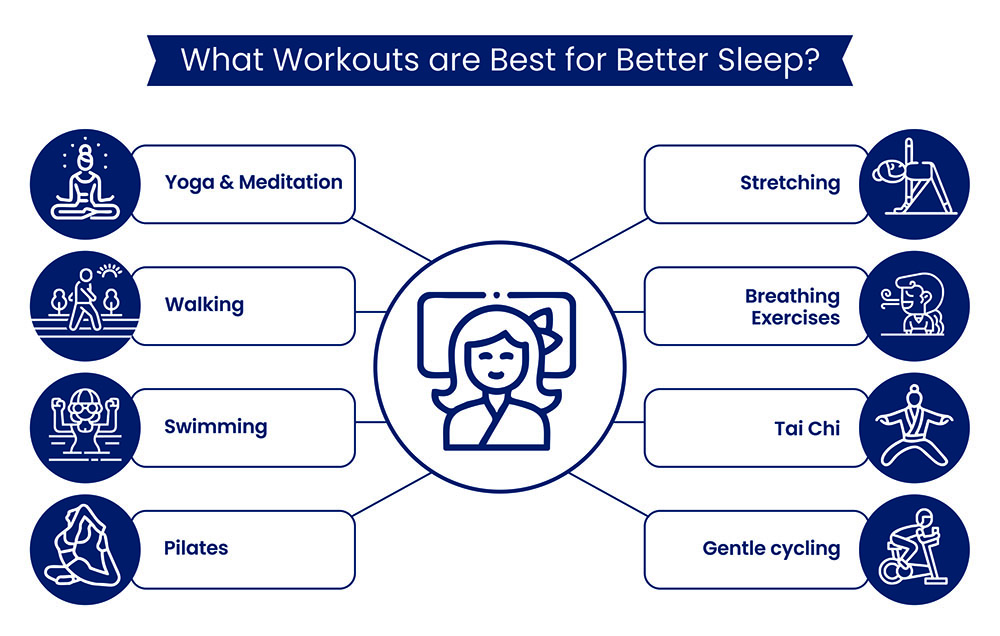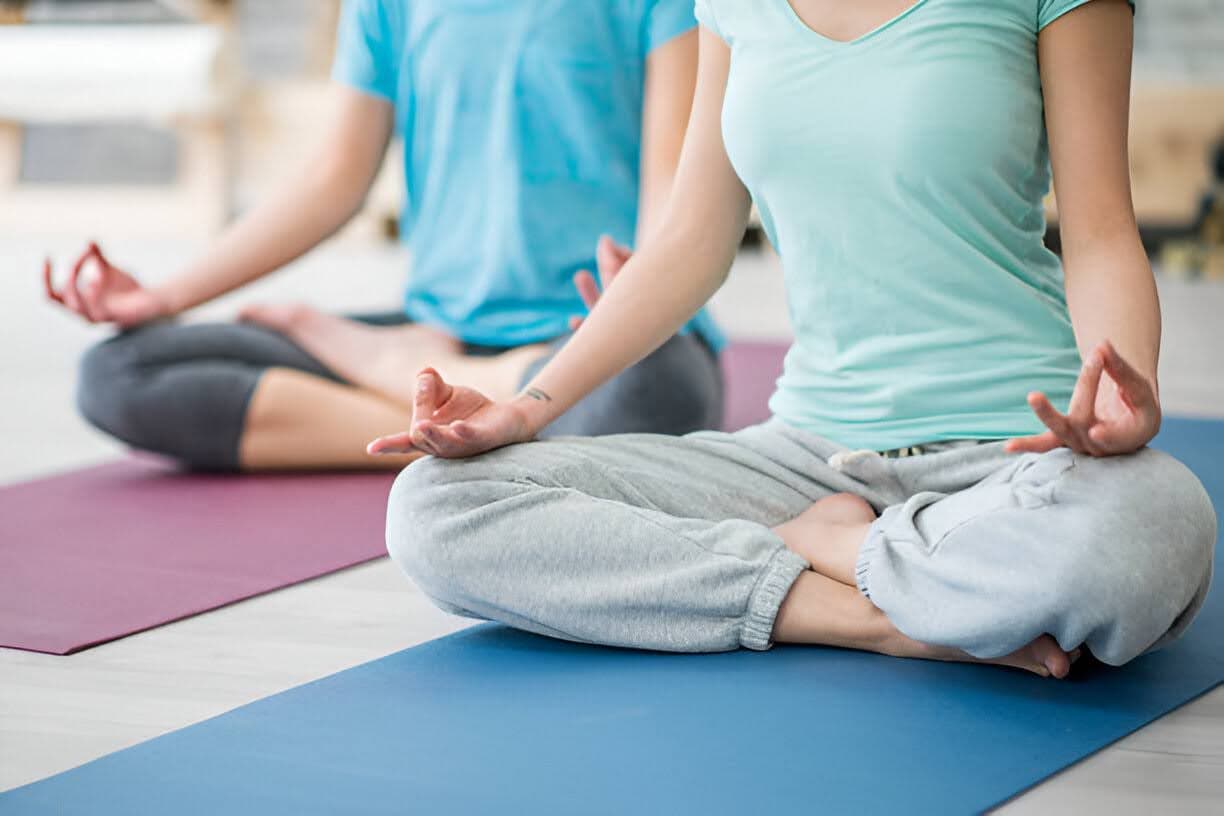Many people cannot sleep at night due to stress, anxiety, and the burdens of a daily routine. Of all the available sleep aids, exercise is perhaps the simplest and most effective. Regular physical activity reduces stress, alleviates anxiety, and brings people to complete relaxation, thus significantly enhancing sleep quality.
Exercise exhausts you, but that is not all; it also initiates the release of endorphins, which can positively alter your mood and overall well-being. The right form of exercise can signal to the body that it needs to relax, and this can be a gentle session of yoga, a brisk walk, or a heavy workout.
This blog will discuss the best exercises for sleep and share tips on incorporating them into your routine. Some movement in your day can lead to more restful nights and wake you up full of energy.
Best Exercises for Better Sleep
Exercise helps tire your body and plays a crucial role in reducing stress and promoting relaxation. Here, we’ll explore some of the best exercises for better sleep quality and provide practical tips for incorporating them into your lifestyle.
Best Exercises for Better Sleep
Exercise helps tire your body and plays a crucial role in reducing stress and promoting relaxation. Here, we’ll explore some of the best exercises for better sleep quality and provide practical tips for incorporating them into your lifestyle.
1. Yoga
Yoga is a fantastic way to promote relaxation and prepare your body for sleep. With its emphasis on deep breathing and gentle stretching, yoga helps calm the mind and release physical tension. Certain poses are particularly beneficial for sleep:
Child’s Pose: This restful pose helps stretch the back and hips while calming the nervous system.
Forward Bend: This pose encourages relaxation and helps relieve stress and anxiety.
Legs-Up-the-Wall: This restorative position promotes circulation and relaxation, making it ideal for winding down.
Try dedicating 15-30 minutes to gentle evening yoga for better sleep. You can follow online videos or join a local class focusing on restorative or yin yoga, specifically designed to relax the body and mind.
2. Walking
Walking is one of the most straightforward yet highly effective exercises to induce sleep. Walking for 30 minutes in the late afternoon or early evening will clear your mind, reduce your anxiety, and put your body out.
Walking outside also has other benefits: the light helps regulate your circadian rhythm. Walking in a park or at some scenic spot enhances the soothing impression of nature. By making it a habit, you may even have more fun with its accompaniment in the form of a friend or family member.

3. Swimming
Swimming is a low-impact sport that gives the swimmer an experience that soothes them. The buoyancy of water supports your body, and the rhythmic motion sometimes provides pleasant feelings.
Target 30 minutes of moderate activity; you may swim laps or float. If you like it, consider joining a local swimming class or club to motivate yourself. Swimming in the evening, perhaps at sunset, is a perfect time to let go of energy after a day of activity.
4. Strength Training
Adding light to moderate intensity strength training can also help with sleep quality. Full-body exercises a few times a week can also develop muscle mass and increase the metabolic rate for healthier overall living.
Concentrate on exercises like squats, lunges, push-ups, and planks. Ideally, you should try to do 30-45 minutes of strength training. Just remember to complete your workout at least three hours before bedtime and allow your body to cool off and relax before sleep.
5. Stretching
This is the easiest way of having a good time to unwind and prepare your body for sleep. Stretching is excellent when performed regularly, with your primary target being major back, legs, and shoulder muscles.
Hold each for 20-30 seconds and breathe deeply into the new feeling in your body to release the tension. You can also use soft music or dim lights to create a space that will help to enhance the relaxing effects. This can also be especially useful at bedtime, letting your body know it is time to wind down.
6. Breathing Exercises
While not traditional exercise, deep breathing exercises for sleep can significantly aid in relaxation and prepare your mind for sleep. Practicing deep, slow breaths can calm your nervous system and reduce anxiety.
One effective technique is the 4-7-8 breathing method: inhale through your nose for four counts, hold your breath for seven counts, and exhale slowly through your mouth for eight counts. Spend a few minutes on this breathing exercise to fall asleep and ease your mind and body into a restful state.
7. Meditation
Guided sleep meditations are excellent if you want to help the quality of your sleep. Techniques, such as progressive muscle relaxation, help you relax and allow for deep relaxation. These relaxation exercises for sleep calm the mind and body, so they let you sleep. By focusing on the breath and gently tensing and relaxing each muscle group, you are preparing to catch some rest. Try to include some of these meditations in your bedtime routine for better sleep and an even more refreshing morning.
Tips for Incorporating Exercise into Your Routine
Here are some sleep hygiene tips:
Timing is Key: Be mindful of when you exercise. Aim to finish vigorous workouts at least three hours before bedtime, as exercising too close to bedtime can energize your body and make it difficult to fall asleep.
Listen to Your Body: Everyone responds differently to exercise. Pay attention to how various activities affect your sleep. Some people may find that cardio energizes them, while others prefer calming exercises like yoga or stretching.
Create a Routine: Consistency is crucial for reaping the sleep benefits of exercise. Try to work out at the same time each day to establish a habit. This could mean a morning walk, an afternoon yoga session, or evening strength training—whatever fits best into your schedule.
Stay Hydrated: Proper hydration throughout the day is essential, but be mindful of your fluid intake before bed to minimize nighttime trips to the bathroom.
Don’t Overdo It: The longer or more intense your exercise routine, the more significant the physiological changes you may make. Yet, as briefly as 30 minutes of moderate exercise can help relieve anxiety and improve sleep at night. One study noted that moderate aerobic exercise routines of six months duration can be very beneficial in enhancing sleep, mood, and overall quality of life.
Final Thoughts
Exercise can make all the difference in terms of how well you sleep. Gentle yoga, refreshing walks, or even calming meditation- the right movement can soothe your nerves and prepare your body for sleep. Remember that consistency is key, so find activities you enjoy and create a routine around them that you can stick to. Pay attention to your needs and be open and willing to change your routine if that's what you must do. A little commitment in paving the way may make nights restful and mornings refreshed.






















